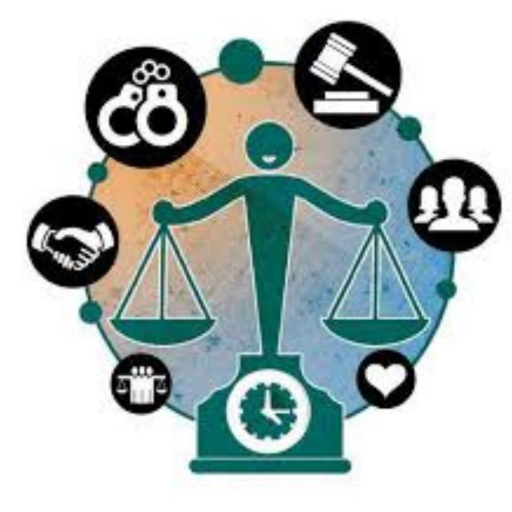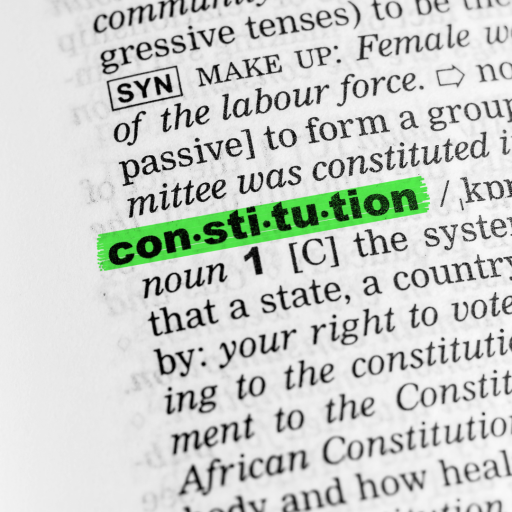

KLE September Activity – Right – o – Meter
OBJECTIVES
- Students will be able to analyse their own experiences & observations to assess the democratic nature of their school.
- Students will be able to identify different ways and suggest ideas for making their school more democratic.
- Students will be able to recognize linkages between their rights in schools with fundamental rights of citizens.
OUTCOMES
- Students will be able to reflect on their personal observations & experiences to assess the democratic nature of their school.
- Students will be able to actively participate in suggesting ways/ideas to make their school more democratic.
- Students will be able to describe the linkages between their rights in schools with fundamental rights of citizens in their own words.
SKILLS AND VALUES
Skills - Collaboration, Critical Thinking, and creativity, reasoning
Values – Democratic Spirit, responsibility
SESSIONS’ OVERVIEW
| S. No. | Session Details | Estimated Time Required |
| 1 | Step 1: Introduction
Step 2: Survey
|
45 Minutes |
| 2 | Step 3: Democratic School Suggestion Box
Step 4: Debrief of Activity |
45 Minutes |
MATERIAL REQUIRED
Notebooks, pens, empty shoe box/any other box to make suggestion box.
(Teacher can ask the office bearers to prepare suggestion box with any available material following the best out of waster approach. Ask them to label it Democratic School Suggestion Box)
STEPS OF THE ACTIVITY
Session 1: For a 45 min session Step 1-2
Step 1 – Introduction
Time: 10-15 min
- Introduce the class with the topic for the day using the introduction section.
- Explain to the students the activity in brief. Tell them that we as Indian citizens have certain rights provided by our Constitution and that students also are entitled to some rights at home and at school. (Teacher can refer to Annexure 2 for Fundamental rights)
- Tell them about rights and summarize that school is a place where we can learn the concepts of rights and duties with live examples and practices.
- Tell that today we are going to conduct a survey as part of which the students will in pairs need to give a rating on certain parameters based on their experiences and observations about their school.
Step 2 – Survey
Estimated Time: 30 mins.
- Divide the students into pairs to begin the activity and share the “Record Sheet” given in Annexure 1 with all students. (Teacher can display the sheet on smartboard/or read out the sentences one by one, give each pair time to discuss and mark the option)
- Ask the students to read/listen to each statement and assess how accurately it describes your school in the blank space next to it. (Keep in mind all members of your school: students, teachers, administrators, staff, etc.)
- Give a rating from 0-2 (Neutral is 0, Disagree is 1, Agree is 2) as per the pair (your & your partner’s) observations and experiences.
- In the end, ask them to total the scores to determine your overall assessment score for your school.
- Students need to calculate the scores given for each statement to assess their school’s Right–o–Meter. Teacher can then ask students to raise hands for different Score Range – 0-40 as given below.
- a) Highly democratic– 26-40
- b) Medium democratic – 16-25
- c) Less democratic – 0-15
Note:
- Please note that the survey is general in nature and can be conducted with all students.
- This activity is not to evaluate the school, but to teach students the concepts related to a democratic environment. Therefore, nothing is right or wrong here, this is only to invite and gauge students’ observations and experiences.
Homework:
Teacher would ask students to think ideas based on the statements today to make their school more democratic and bring them in the next session.
Note: Please pre-inform the date of the next session for students to bring completed homework on the activity day.
Session 2: For a 45 min session Step 3-4
Step 3 – Democratic School Suggestion Box
Estimated Time: 30 mins
1. Teacher will ask students as pairs to discuss their suggestions (HW) and write two-three suggestions to make your school more democratic than it already is and add it to the suggestion box (to be installed at school premises/classroom). Each suggestion to be on different slip. Each pair to share atleast two and not more than five.
2. Inform the students that each pair will get 8-10 mins to submit their suggestions.
(Teacher can share some examples of suggestions – a) creation of "Right to Expression" time/corner where students can freely express their opinions and ideas, promoting freedom of speech and expression. B) Having a safety committee to address and prevent bullying, etc)
3. Teacher can then read few suggestions added in the suggestion box for everyone.
Note: Teacher can leave the suggestion box in class for 7-10 days – students can add suggestions as they observe. Teacher can also ask students to involve other grades to add suggestions. (Optional)
4. Teacher will then summarize the discussion with help of debrief questions.
Step 4 – Debrief of Activity
Estimated Time: 10 mins
Ask students the following questions to debrief the activity - to share the following:
- What have you learnt from the given activity?
- How do fundamental rights guaranteed to citizens of India relate to the rights and responsibilities you identified in your school? Share few examples/instances.
- Why is it important for school administration, teachers, and students to work together to maintain a smooth functioning of a democratic school?
- What aspects of an alert, informed, and active citizen are covered through this activity according to you?
Reflection Sheets, Activity Report & Feedback Form
Teachers kindly fill in the feedback form, remind office bearers to fill activity report and remind students also to fill up the reflection sheets.
REFLECTION SHEET (TO BE FILLED BY STUDENTS)
REFERENCE SECTION / ANNEXURE
Annexure 1 – Record Sheet
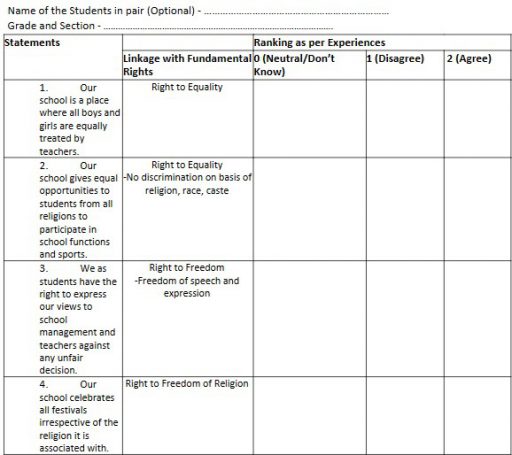

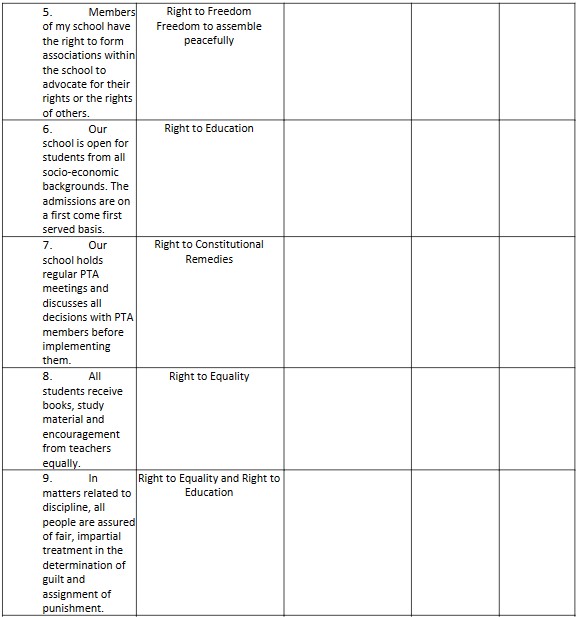

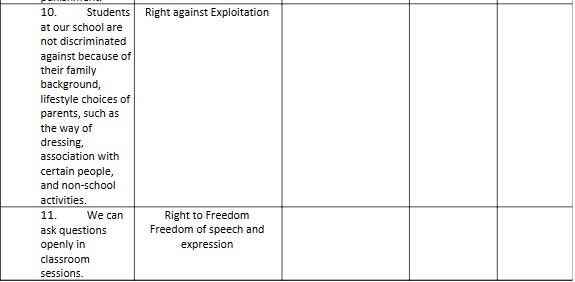

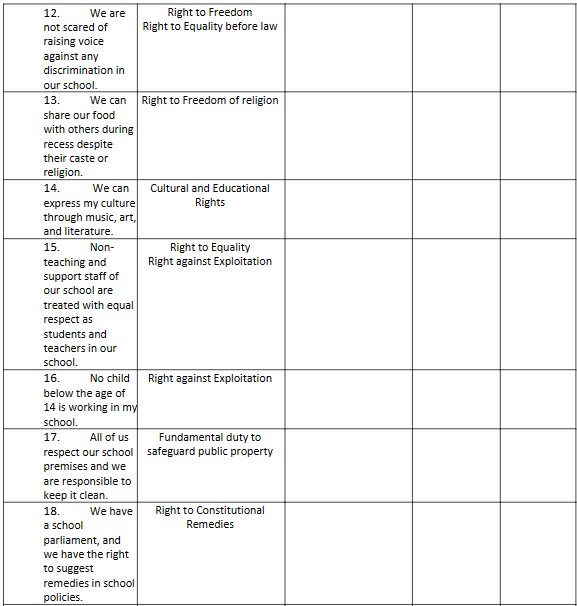

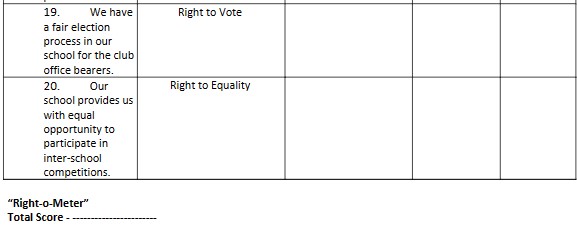

Annexure 2 – Fundamental Rights
Fundamental Rights:
- Right to Equality: It means that everyone should be treated the same, no matter who they are or where they come from.
- Right to Freedom: It means that everyone has the right to speak their mind, worship as they choose, and live their life as they want, if they don't hurt others.
- Right against Exploitation: It means that no one should be forced to work without pay, be sold, or bought like an object, or be treated unfairly by anyone else.
- Right to Freedom of Religion: It means that everyone has the right to choose their own religion or beliefs and to practice them without fear of being punished or discriminated against.Cultural and Educational Rights: It means that everyone has the right to learn and speak their own language, to practice their own culture, and to be educated without discrimination.
- Right to Constitutional Remedies: It means that everyone has the right to seek justice in a court of law if they feel their rights have been violated, and the government must provide a fair and speedy trial.
Note: Students can also refer to Textbooks for Fundamental rights.





